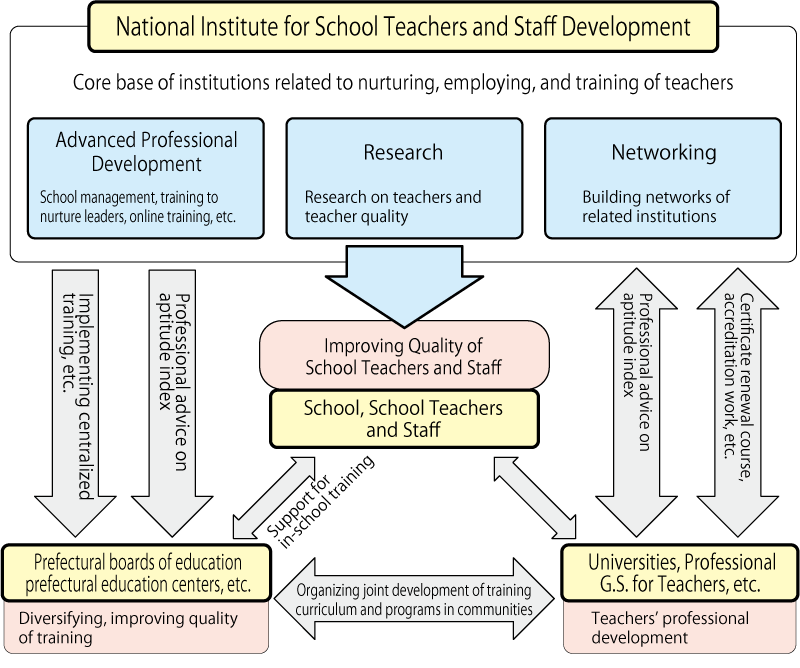Institute History, Missions and Functions
Institute History
 National Institute for School Teachers and Staff Development (NITS) is the national center for delivering in-service training for school teachers, school staff and administrative personnel at Boards of Education. We aim to advance their trait and competency under national education policies.
National Institute for School Teachers and Staff Development (NITS) is the national center for delivering in-service training for school teachers, school staff and administrative personnel at Boards of Education. We aim to advance their trait and competency under national education policies.
In 2001 the predecessor organization, the National Center for Teacher Development (NCTD) was delegated from its earlier state-run organization, and in 2017, the NCTD was converted legally into the present-new incorporated administrative agency, i.e. NITS.
Missions and Functions
New Mission: From National Center to National Institute
Following the recommendation issued by the Central Education Council, the Administrative Law for the National Center for Teacher Development was appropriately amended to carry new responsibilities delivering a holistic professional development for school teachers and support personnel, thus generating a new organization, the National Institute for School Teachers and Staff Development (NITS). The predecessor organization, the National Center for Teacher Development (NCTD), was primarily responsible for providing professional development programs to the teachers sent from local BoEs. NITS continues the responsibility of delivering quality professional development programs, whilst at the same time, it makes further investments in perfecting the programs and their delivery. NITS is also expected to take concrete action as the core institution to bridge compartmentalized bodies of teacher preparation, teacher hiring and their professional development. Thus, NITS was launched through making a substantial structural reorganization to NCTD.
Mission One: Networking
NITS holds the responsibility of providing a networking opportunity for all those invested in teacher preparation, teacher hiring and their professional development to work in collaboration. NITS is going to serve as an advising institution that provides concrete information, empirical data and other resources to local BoEs and their council, in order to help them make evidencebased decisions for generating an aptitude index to support teachers’ professional development. It should not be neglected that building a meaningful collaboration with the Professional Graduate Schools for Teachers is also critical for the advancement of quality professional development. In fact, NITS has already had collaborative agreements with 20 Professional Graduate Schools for Teachers nationwide, to launch a joint curriculum development project to deliver more effective professional development for teachers. NITS is going to build more networking opportunity across the Professional Graduate Schools for Teachers to foster greater collaboration in research and development for more effective professional development systems for teachers.
Mission Two: Research on Teachers and Teacher Quality
One major difference between NITS and its predecessor NCTD is that NITS shoulders a responsibility as a research institute. NITS serves as a research institute from April 2017 with a scope to provide knowledge to be used in policies geared to effect a holistic education reform that enables diverse actors of teacher development to work together to ensure the quality development of teaching professions. Five research themes are currently ongoing under the supervision of two full-time research fellows: (1) theoretical research on the quality of teaching professions for the development of teacher’s aptitude index and strategic curriculum for teachers’ professional development, (2) international comparative study on teacher preparation, hiring and professional development, (3) research on learning and pedagogy in knowledge-base society, (4) pragmatic inquiry on teacher’s time-management skills, and (5) research on more effective and efficient administration of teacher recruitment examinations.
Mission Three: Advanced Professional Training
Providing effective and meaningful professional development programs had been one of the fundamental roles for NITS’s predecessor organization, NCTD. NITS continues on this responsibility, whilst putting more efforts in developing and sharing a more advanced and structured delivery of professional development opportunities, both directly, through national-level training programs, and indirectly, through guiding ⁄ advising local providers of professional development programs. In addition to the traditional and more formalized training, NITS aims to develop more flexible professional development programs which teachers can access and utilize individually at their convenience. In order to make quality professional development programs both available and accessible for teachers, NITS aims to offer a diverse range of training opportunities and programs from a long-term training program in collaboration with Professional Graduate Schools of Teachers to online-training materials for individual teachers. Fostering greater sophistication in the current OJT practice is an especially important mission, because of its potential to support the culture of collaborative development of teachers. NITS thus puts its resources into developing content materials, programs and media to support enrichment of OJT at and in local school level.
Based on the missions mentioned above, and Article 10, Act on National Institute for School Teachers and Staff Development (Act No. 87 of November 28, 2016), we have six functions as follows:
- Provides in-service trainings for school teachers, school administrators and public education personnel,
- Provides both research and policy based advice for local boards of education on Capability Index for Teaching Professions,
- Provides assistance to local boards of education, advising on their professional development programs,
- Conducts research on teacher education, focusing on developing a holistic view on teachers’ career development,
- Provides administrative support for accreditation of Teacher License Renewal Programs; and,
- Administers Teacher Certification Examinations conducted by the Ministry of Education.


